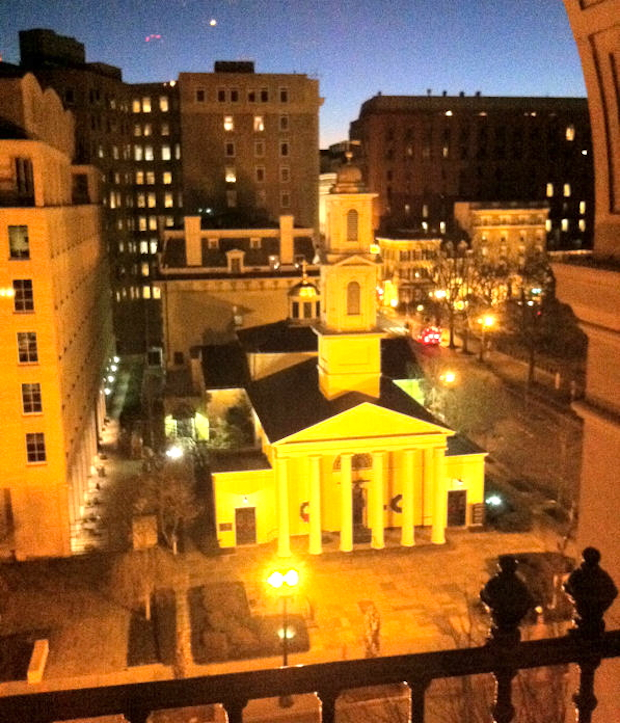My husband Clyde and I spent Christmas in Washington, DC. We treated ourselves to a stay at the renowned Hay Adams Hotel, just up the street from the White House. Our suite’s balcony overlooked a Washington landmark, St. John’s Church, the Church of Presidents.
While we were there, I would wake up in the night, go out on the balcony, and look at the church. Bright lights illuminated the exterior of the church, and Christmas wreaths with red bows hung on each side of the double doors. I saw a homeless man wrapped in blankets sleeping on the porch of the church every night.
The last few nights of our visit, the weather was below freezing. I found it unbelievable: Here was a man in such need, and the administrators of the church appeared to have ignored him. At the very least, couldn’t they have invited him in to sleep in the foyer? Parishioners who were attending the Christmas sing-along service passed him by as if he were invisible. It seemed so hypocritical.
On Christmas morning, I got up early, just as the sun was coming up. I opened the door of the room to collect the newspaper and, hanging on the doorknob, was a Christmas gift from the hotel: a velvet bag the color of wine. It was covered in jewels of various colors—fake jewels, of course, but it was pretty. A thin, silk, braided rope gathered and closed the bag at the top. Opening it, I saw that it was filled with gold coins, actually chocolate candies wrapped in gold foil. I liked this gift; it would be a great place to carry my jewelry when I traveled, I thought.
Back in the room, I walked onto the balcony and looked down at the church. The homeless man was still there on the porch.
I had heard on the news the night before that it would be 23 degrees in Washington on Christmas morning. So I went back inside, dressed, careful not to wake Clyde, picked up the red wool cap I’d gotten him for Christmas, grabbed all the cash I had in my wallet—$80—stuffed it in the cap, and took the elevator down to the lobby.
Stepping out of the elevator, I was enveloped by the smell of steaming hot chocolate coming from the silver service. I was tempted to stop and have a quick cup, but instead, I wished the doorman who saw me out a “Merry Christmas” and crossed the street to the church.
The homeless man saw me coming. He looked confused and a little nervous.
He was dressed in layered rags. It was hard to judge his age, late 40’s maybe, and when he stood up, I could see he was tall and thin. I walked up close to him, like you would if you were going to shake somebody’s hand. Smiling into his face, I handed him the bejeweled bag of chocolates and said, “Good morning! I just wanted to wish you Merry Christmas!”
His voice cracked—not from emotion, but from weariness and exposure—as he answered, “Okay.”
Then I opened the top of the red cap just enough so that he could see the cash tucked inside and gave it to him. “I thought you could use this cap,” I said. He was looking into the cap. He hesitated, looked up at me: ” Okay,” he said again, through crooked, mangled teeth.
He sounded confused, not aloof or rude, just confused, submissive, and still dulled by sleep. It wasn’t the effusive “Thank you! God bless you! You are a wonderful person!” that I realize now I half expected. It was as if I’d wound up a toy, expecting it to dance for me, but it hadn’t worked. It didn’t move.
“Merry Christmas!” I said again.
“Okay.”
“Alrighty then!” I said, turning and walking down the steps and back across the street to my fancy, warm hotel, feeling all good about myself and thinking that that had been the proper way to start Christmas day. Indeed, as they say, there is no such thing as an unselfish act.
After availing myself of the hot chocolate, I returned to our room. Clyde was still asleep. I went to the balcony and looked down at the church. What did I expect to see? The man jumping for glee because an angel of mercy had come down from the sky to help him? He had to have seen me up there on my balcony at some point, hadn’t he? Did I expect to see him packing up his stuff and heading off to have a nice hot breakfast?
He was sitting very still on the floor of the porch, all bundled up, staring at his lap. “Maybe he doesn’t know it’s Christmas,” I thought.
But he was wearing the red cap.
Kay Smith is a retired mother of two adult children. She lives in Southern California and is a member of the Los Angeles Poets and Writers Collective. She spent Christmas in Washington visiting her daughter.










